A panel of experts and female entrepreneurs give advice in a live Facebook Q&A broadcast
Picture Credit: NatWest and Fund Her North are working together to empower women in business (Image: CoWomen, Unsplash)
Global Entrepreneurship Week (Monday, November 8 – Friday, November 12) seems like the perfect time to talk about the opportunities available to female entrepreneurs, and the challenges they have to face to gain investment.
A specialist panel made up of talented and experienced women in business, collaborated to do a live Q&A session, broadcast on the Newcastle Chronicle’s Facebook page, to share their experiences and wisdom on female entrepreneurship.
Chaired by Graeme Whitfield, Business and agenda editor for Reach North East, the panel also discuss how NatWest and Fund Her North have partnered up to support female entrepreneurs on their investment journey.
Fund Her North (FHN) is a Northern-based volunteer collective of more than 28 women, with a combined investment power of over £450 million, and was launched virtually in October 2020.
One of the panellists – regional ecosystem manager at NatWest – Heather Waters, kicked off the video discussion by saying: “It was recognised back in 2019, at the launch of the Rose Review, that the biggest barrier for female entrepreneurs is access to finance.”
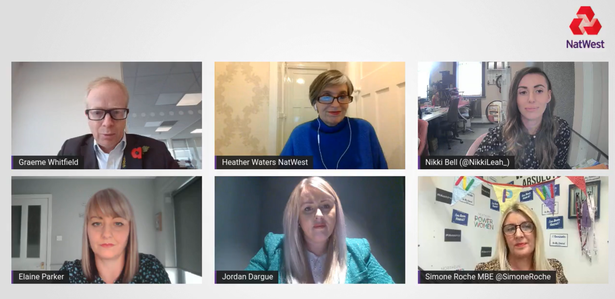
A platform to seek advice
Talking about how NatWest have more than 500 women in business specialists trained to support female entrepreneurs, Heather continued: “Working with Fund Her North this year has been a real breakthrough for us. Actually how we can work, in particular in investment.
“When the Rose Review was launched, they said in the VC (volunteer collective) environment only 1% of their funds went to all female teams, which is rather shocking. So, working with Fund Her North, we are looking to change that, in particular in the North of England.”
Jordan Dargue, an investor at FHN, was asked to explain how the initiative will help boost levels of entrepreneurship in the North East. The senior business leader explained how, when FHN was initiated during the pandemic: “Over 25 women came together, who were operating across the investment landscape.
“It’s really important, obviously, that these women have come together, because what we’ve done is we’ve given a platform for entrepreneurs across the North to come and seek advice. And it can be advice about anything to do with their business, but we have a specific focus to help those women get the investment that they need to scale their business.”
Jordan also mentioned how there are many options for entrepreneurs to go out and raise their own investment. However, what makes FHN different is the focus on female entrepreneurs and the help and advice given to help women to secure their own investment.
When asked about how vital the role of NatWest was in the set up of FHN, Jordan explained how – working closely with people like Heather – they were able to gather more in-depth knowledge about what she has seen and the real struggles women have faced.
She said how this allowed them to “pull together what our proposition should be in the areas of support. What NatWest also gives us is a platform.”
Stories from real people
Nikki Bell – co-founder and CEO of the virtual event platform Everywhere+, and online learning community, Fundraising Everywhere – spoke about her funding journey and the barriers she has had to overcome.
Speaking as someone from a company who is “very early into our funding journey”, Nikki mentioned how the first two years of business brought in over a million pounds with profit, and now they want to “accelerate that progress, because if we can achieve that with no support then, of course, the possibilities are huge with it.”
Nikki also explained about her own personal experience, saying: “Myself personally I found the process quite daunting. How do you start? What should your pitch deck look like? Who do you need to speak to? How much equity do you need to give away?
“I mean, even last week I was at a technology conference which was based around technology startups and helping them get funding. And, you know, even there I was still Googling what some of the terms meant because there is quite a lot of lingo in it.”
Even with a lack of experience in finding her own funding, Nikki said that she has enrolled in the NatWest business accelerator and, thanks to the training programmes, coaches and people she speaks to, it is something she “gets a lot out of.”
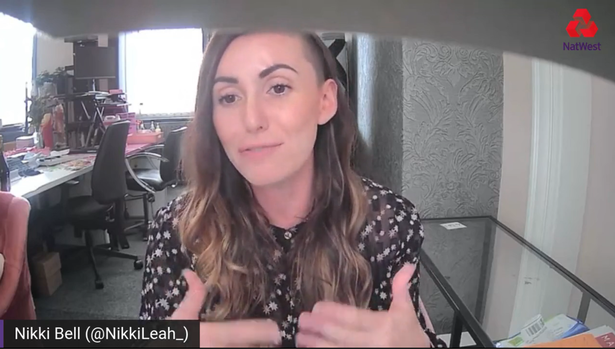
Another guest on the panel was Elaine Parker, a female entrepreneur who founded Safer Date in July 2020, following a traumatic experience with a man she met online.
Explaining how she and her businesses are at a completely different stage to Nikki, the founder of a web development company said: “I’m very independent and quite stubborn to be fair, but asking for money is not something that sits comfortably with me at all. I’ve always been the type of person to do things on my own.”
Elaine continued on to talk about her experience and how she found setting up her own business, agreeing with Nikki that some of the linguistics used are daunting and complicated to understand.
One thing that both the entrepreneurs agreed on the most, as well as the rest of the panel, was that the industry is very male-dominated.
Elaine said: “I have found that it is a very male-dominated space completely. I’ve had some bumps in the road along the way where people have promised the Earth, you know, for helping with the pitch deck and getting me in front of investors. Then actually when it comes down to it, what they promise isn’t actually what they deliver.
“So yeah, Fund Her North was very, very helpful for me. They set me on the journey. Having the support of a team of people like Fund Her North behind you, makes all the difference.”
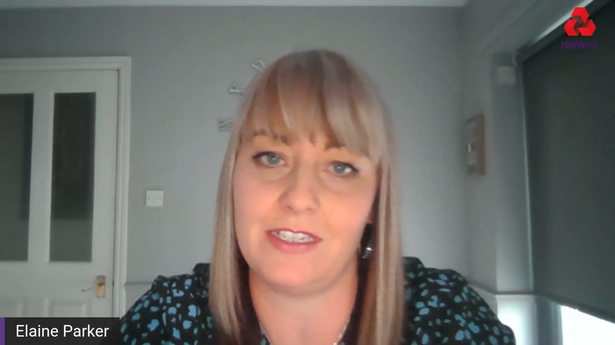
The right support
Simone Roche MBE, founder of Northern Power Women, spoke about how the support isn’t only needed for the start up of a business, but also the growing of the business and future investments.
Speaking about the lack of continued support for female entrepreneurs, the Yahoo Finance Hero 2020 said: “I have seen this time and time again. But that’s why it’s been so positive to work with NatWest over all the years since we’ve created Northern Power Women to tell stories – because people have been there first.
“This is not the first path that this has been trailed, so I think the more we can story-tell about the journeys and experiences of people and to pass that information on is really important.”
Simone reiterated the importance of gathering knowledge from others who have similar experiences and building a network of support.
Relating the findings of their levelling-up report to the Coronavirus pandemic, Simone said: “By far, it was our female-led and black/Asian minority-led businesses that were really hit hard across the pandemic.”
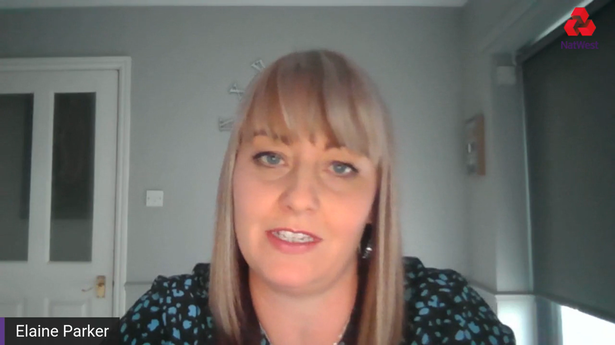
Panel chair, Graeme, asked: “Middle-aged blokes like me are never shy of asking for funding and money, but are women a bit less keen to sort of be the ones saying ‘I want to be big’? And do they need that support to go to that next level?”
Simone answered by talking about the two-zero programme that they ran in Lancashire, designed for scale-up businesses, in January 2020. She mentioned how the programme made them realise how “when we talked about scale-up, we actually realised how we had to deal with the resilience and the survival first.”
She mentioned how one of the most important things is myth busting around funding and finance, in particular debt. She said: “The entrepreneur, Sam White, turned round and said ‘well most people have a mortgage, that’s debt.’
“I think there’s a language around how we change this and by the end of this programme we saw every single one of those female-led businesses apply for the funding, grow their business.”
Shocking statistics
The Rose Review of female entrepreneurship back in 2019 found some surprising statistics to do with women in business. Heather, spoke about how, even though the findings are updated every year, she found some facts particularly shocking.
She said: “What came out of there was the lack of understanding knowledge of a funding landscape was huge, the conception of lack of skills for women as well.
“Women saying ‘I don’t think I am right for this, I don’t think it’s for me to do.’ And that relays into when we get the data through. Only one in three entrepreneurs are female, yet we’re supposed to be more than fifty percent of the population.”
Not only are less women entrepreneurs than men, but according to the data, Heather said: “We [women] don’t scale businesses the same as men. The typical woman-owned business would be about 40 percent the size of a man-owned business.”
According to the Rose Review, having relatable people and role models to give advice and support to women starting and growing their own business, is one of the most important things.
All of the panellists agreed that one of the most important things that women should have access to is a strong community and networks where they can gain and share knowledge to help others who have a lack of support.
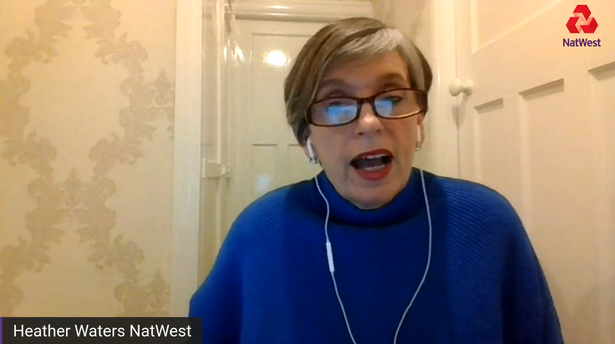
Men can be good advocates for women in business
When asked what men can do to help, Simone answered: “Be intentional. I think, for me, advocacy is all about that intention. So it’s, you know, we’re all really big fans of mentoring but we’re really fans of that sponsorship approach.
“So, what is that door that you can open? What is that seat you can get at the table? Where is that voice that you can amplify? It’s all the small things, but they all add up. There’s been the all boys club forever and ever.”
Words of advice
To finish off the session, Graeme ended with one final question to all the panellists: “What would you say to a woman wanting to start their own business? What words of advice would you give?”
Simone said: “I think one hundred percent you’re not alone. You’re not the first person to have trodden this path, and maybe you’ve got something really innovative and really creative that you think is very new.”
Jordan answered: “The first thing I would say is absolutely have confidence and belief in yourself because women are very powerful and very strong minded. If they feel they have something they want to be able to do, have the confidence to do it, there’s lots of advice and support around us.”
Nikki commented: “Get your idea out there. You’ll be surprised how quick it will accelerate once you speak that into existence, and don’t worry about it being perfect. Get it out there, share it with the people that’s intended for and just build on it.”
Elaine said: “Remember that all of the massive conglomerates across the world started out with somebody’s idea. You don’t need to have all of your ducks in a row, you don’t need to have all of the information to hand. If you’ve got an idea and you want to start a business, go for it.”
Heather answered: “Do get some support, there’s lots and lots of support out there. Apply for our accelerator programme. Join a community of people who are there doing the same thing as you, get a coach to help you.”
Article Credit: chroniclelive.co.uk
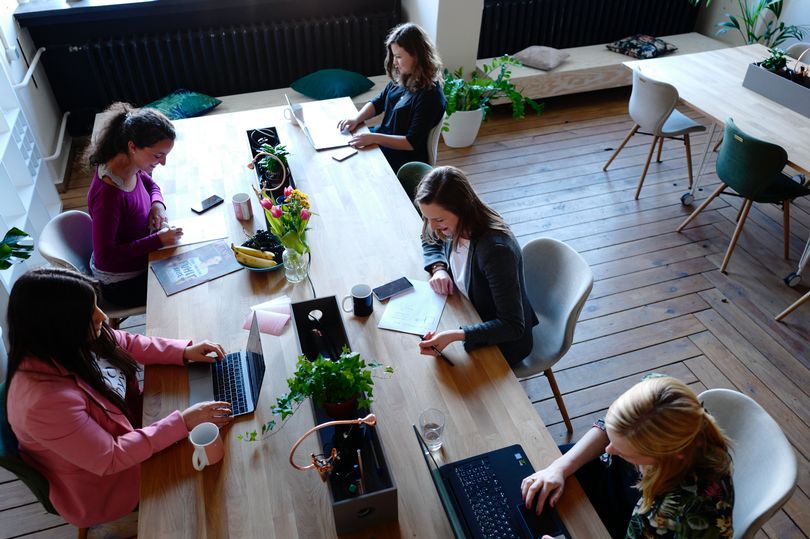
Pingback: Newark Filmmaker Explores Lives Of 2 Blind, Black Women Entrepreneurs - SLSV - A global media & CSR consultancy network